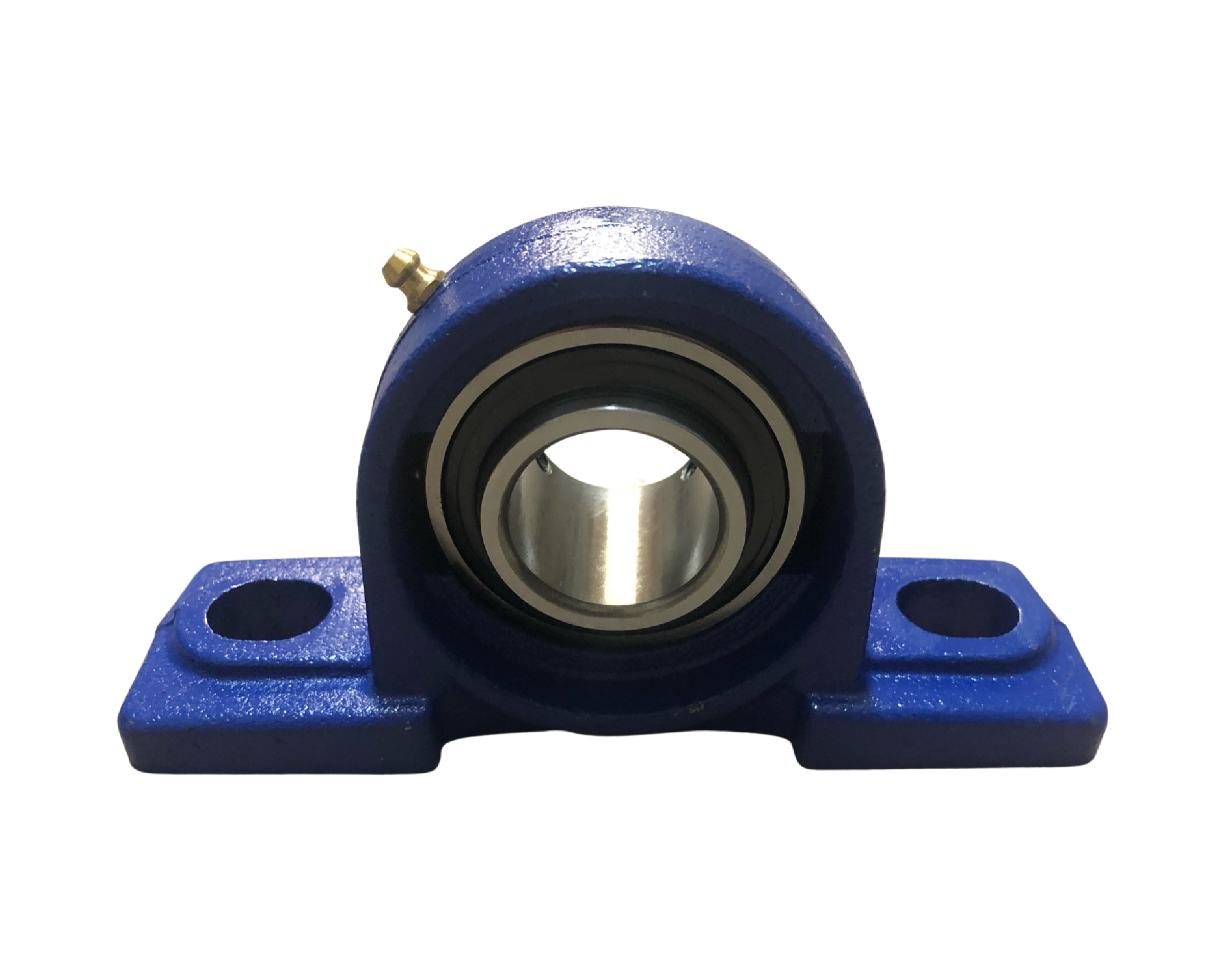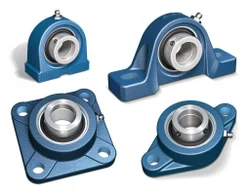
Can you explain the differences between sealed and open pillow block bearings?
Sealed and open pillow block bearings differ in their design and functionality, particularly in terms of sealing mechanisms and the level of protection they provide. Here are the key differences between sealed and open pillow block bearings:
- Sealing Mechanism:
- Contamination Protection:
- Lubrication:
- Maintenance:
- Application Suitability:
Sealed pillow block bearings incorporate a sealing mechanism to prevent the entry of contaminants, such as dirt, dust, and moisture, into the bearing. The sealing mechanism is typically made of rubber seals or labyrinth seals that create a barrier between the bearing’s internal components and the external environment. Open pillow block bearings, on the other hand, do not have a sealing mechanism and are open to the surrounding environment.
Sealed pillow block bearings provide a higher level of protection against contamination compared to open bearings. The sealing mechanism acts as a barrier, preventing the entry of contaminants that can cause premature wear, corrosion, or damage to the bearing’s internal components. Open pillow block bearings, by contrast, are more exposed to the surrounding environment and are more susceptible to contamination.
Both sealed and open pillow block bearings require proper lubrication for smooth operation and reduced friction. Sealed bearings are typically pre-lubricated with grease during manufacturing and are designed to be maintenance-free or require minimal lubrication throughout their operating life. Open bearings may need to be lubricated more frequently to ensure optimal performance and prevent excessive wear. Lubrication access points are more accessible in open bearings compared to sealed bearings.
Sealed pillow block bearings are designed to be low maintenance or maintenance-free. The sealing mechanism helps to retain the lubricant and protect the bearing’s internal components, reducing the need for frequent maintenance. Open pillow block bearings may require more regular maintenance, including lubrication, inspection, and cleaning, to ensure proper functioning and extend their lifespan.
The choice between sealed and open pillow block bearings depends on the specific application requirements. Sealed bearings are commonly used in applications where contamination protection is crucial, such as in dusty or dirty environments. They are particularly suitable for applications where maintenance access is limited or where frequent lubrication is not feasible. Open bearings are often used in applications where regular maintenance and lubrication are possible and where contamination is not a significant concern.
It’s important to consider the specific operating conditions, environmental factors, and maintenance capabilities when deciding between sealed and open pillow block bearings. Consulting with bearing manufacturers or industry experts can provide valuable guidance in selecting the most suitable option for your application requirements.

How do pillow block bearings contribute to the efficient operation of conveyor systems?
Pillow block bearings play a crucial role in ensuring the efficient operation of conveyor systems. Their contributions can be outlined as follows:
- Support and Load Handling:
- Reduced Friction and Wear:
- Alignment and Stability:
- Protection and Contamination Prevention:
- Maintenance and Accessibility:
Pillow block bearings provide support for the rotating shafts in conveyor systems. They are responsible for handling and transmitting the loads applied to the conveyor, including the weight of the conveyed material and any external forces. By effectively supporting the shaft, pillow block bearings help maintain the structural integrity of the conveyor and ensure smooth and efficient movement of the material.
Pillow block bearings are designed to minimize friction between the rotating shaft and the bearing housing. They incorporate rolling elements, such as balls or rollers, which facilitate smooth motion with reduced friction. By reducing friction and wear, pillow block bearings help optimize the energy efficiency of the conveyor system, minimizing power consumption and extending the lifespan of the bearings and other related components.
Proper alignment of the conveyor components is essential for efficient operation. Pillow block bearings aid in aligning and supporting the shaft, ensuring that it remains centered and in the correct position. This alignment helps prevent excessive vibrations, reduces the risk of misalignment-related issues, and promotes stable and consistent performance of the conveyor system.
Pillow block bearings are designed to provide protection against contaminants, moisture, and debris in the operating environment. They often incorporate sealing mechanisms, such as rubber seals or labyrinth seals, to prevent the entry of foreign particles into the bearing. This protection helps maintain the cleanliness of the bearing’s internal components, reducing the risk of premature wear, corrosion, or damage. By preventing contamination, pillow block bearings contribute to the efficient and reliable operation of the conveyor system.
Conveyor systems require periodic maintenance, including bearing inspection, lubrication, and potential replacement. Pillow block bearings are designed with ease of maintenance in mind. They often feature a split housing design that allows for convenient access to the bearing without disassembling the entire conveyor system. This accessibility simplifies maintenance tasks, reduces downtime, and promotes efficient upkeep of the bearings, ensuring the long-term reliability and performance of the conveyor system.
In summary, pillow block bearings contribute to the efficient operation of conveyor systems by providing support, handling loads, reducing friction and wear, ensuring alignment and stability, protecting against contaminants, and offering ease of maintenance. With their essential role in supporting and facilitating the movement of conveyor shafts, pillow block bearings help optimize the performance, energy efficiency, and longevity of conveyor systems.

How does proper lubrication impact the performance and longevity of pillow block bearings?
Proper lubrication plays a crucial role in the performance and longevity of pillow block bearings. It ensures smooth operation, reduces friction and wear, dissipates heat, and protects against corrosion. Here’s a detailed explanation of how proper lubrication impacts the performance and longevity of pillow block bearings:
- Reduced Friction and Wear:
- Heat Dissipation:
- Protection Against Corrosion:
- Prevention of Contamination:
- Extended Service Life:
Lubrication forms a thin film between the rolling elements and the raceways of the pillow block bearing. This film of lubricant reduces friction and minimizes wear by providing a lubricating barrier between the moving surfaces. Reduced friction results in lower energy consumption, less heat generation, and decreased wear on the bearing components, leading to improved performance and prolonged service life.
During operation, pillow block bearings can generate heat due to the friction between the rolling elements and the raceways. Proper lubrication helps to dissipate this heat by carrying it away from the bearing surfaces. Effective heat dissipation prevents excessive temperature rise, which can cause lubricant degradation, thermal expansion, and accelerated wear. By maintaining proper lubrication, the pillow block bearing can operate within the desired temperature range, ensuring optimal performance and preventing premature failure.
Lubrication provides a protective barrier that helps to prevent corrosion and rust formation on the bearing surfaces. Corrosion can occur when moisture or contaminants penetrate the bearing and react with the metal surfaces. The lubricant acts as a barrier, preventing direct contact between the metal surfaces and the external environment, thus inhibiting corrosion and preserving the integrity of the bearing components. Proper lubrication with corrosion-resistant lubricants is particularly important in environments with high humidity, exposure to water, or corrosive substances.
Pillow block bearings are susceptible to contamination from dust, dirt, and other particles present in the operating environment. Proper lubrication with appropriate sealing or shielding options helps to prevent the ingress of contaminants into the bearing. The lubricant forms a protective barrier, sealing off the bearing and reducing the risk of particle intrusion. By minimizing contamination, proper lubrication helps to maintain the smooth operation and integrity of the bearing, preventing premature wear and failure.
By ensuring proper lubrication, the performance and longevity of pillow block bearings can be significantly improved. Proper lubrication reduces friction, wear, and heat, while providing protection against corrosion and contamination. These factors collectively contribute to the extended service life of the bearing. Regular lubrication maintenance, including monitoring the lubricant condition, replenishing or replacing the lubricant as necessary, and following the manufacturer’s recommendations, helps to maximize the service life of the pillow block bearing and optimize its performance.
In summary, proper lubrication is essential for the performance and longevity of pillow block bearings. It reduces friction and wear, dissipates heat, protects against corrosion, and prevents contamination. By maintaining proper lubrication, the pillow block bearing operates smoothly, experiences less wear, and remains protected from external factors, leading to improved performance, extended service life, and enhanced reliability.


editor by CX 2024-03-27